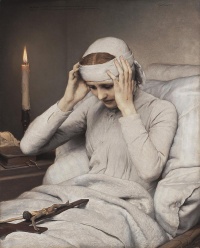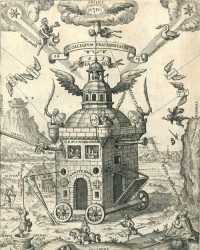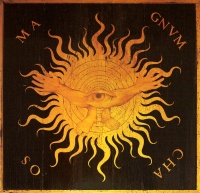Mysticism
From The Art and Popular Culture Encyclopedia
| Revision as of 09:05, 1 June 2009 Jahsonic (Talk | contribs) ← Previous diff |
Revision as of 09:26, 1 October 2022 Jahsonic (Talk | contribs) Next diff → |
||
| Line 1: | Line 1: | ||
| + | [[Image:The Ecstatic Virgin Anna Katharina Emmerich.jpg|thumb|left|200px|This page '''{{PAGENAME}}''' is part of the [[religion]] series. | ||
| + | <br><small>Illustration: ''[[The Ecstatic Virgin Anna Katharina Emmerich]]'' by (1885) by Gabriel Cornelius von Max</small> | ||
| + | ''See also [[Christian mysticism]], [[Anne Catherine Emmerich]], [[Teresa of Ávila]], [[visionary]]'']] | ||
| + | {| class="toccolours" style="float: left; margin-left: 1em; margin-right: 2em; font-size: 85%; background:#c6dbf7; color:black; width:30em; max-width: 40%;" cellspacing="5" | ||
| + | | style="text-align: left;" | | ||
| + | "[[Huysmans]] declares that the [[Mysticism|mystic]] is the most practical person alive — [[Yeats]] has dived deeply into the writings of the exalted, from [[Joachim of Flora]] to [[Jakob Böhme |Jacob Boehme]], from [[St. Teresa]] to [[William Blake]]. " --''[[The Pathos of Distance]]'' (1913) by James Huneker | ||
| + | |} | ||
| + | <hr> | ||
| + | [[Image:Speculum Sophicum Rhodostauroticum.jpg|thumb|right|200px|This page '''{{PAGENAME}}''' is part of the [[fantastique]] series. | ||
| + | <br><small>Illustration: ''[[The Invisible College of the Rose Cross Fraternity]]''</small>]] | ||
| + | [[Image:Magnum Chaos by Lorenzo Lotto and Giovan Francesco Capoferri.jpg|thumb|right|200px|This page '''{{PAGENAME}}''' is part of the [[Greek mythology]] series. | ||
| + | <br><small> | ||
| + | ''[[Magnum Chaos]]'' by [[Lorenzo Lotto]] and [[Giovan Francesco Capoferri]] | ||
| + | </small>]] | ||
| {{Template}} | {{Template}} | ||
| - | :''[[Christian mysticism]], [[Emmerich]], [[Teresa of Avila]], [[visionary]]'' | ||
| '''Mysticism''' (from the [[Greek language|Greek]] μυστικός (''mustikos'') "an initiate" (of the [[Eleusinian Mysteries]], μυστήρια (''musteria'') meaning "[[initiation]]" is the pursuit of achieving communion or [[Unio Mystica|identity]] with, or conscious awareness of, ultimate [[reality]], the [[divinity|divine]], [[Spirituality|spiritual truth]], or [[God]] through direct experience, intuition, or insight; and the belief that such experience is one's destiny, purpose, or an important source of knowledge, understanding, and [[wisdom]]. Traditions may include a belief in the literal existence of dimensional realities beyond [[empiricism|empirical]] [[perception]], or a belief that a ''true'' human perception of the world transcends logical reasoning or intellectual comprehension. A person delving in these areas may be called a '''mystic'''. The term ''mystical'' has been applied to writers such as [[William Blake]] and certain [[poem]]s such as "[[In Memoriam A.H.H.]]" by [[Alfred Tennyson]]: the metaphorical approach has often moderated the literalism of religions and is an important component of the interpretation of mystical writing. | '''Mysticism''' (from the [[Greek language|Greek]] μυστικός (''mustikos'') "an initiate" (of the [[Eleusinian Mysteries]], μυστήρια (''musteria'') meaning "[[initiation]]" is the pursuit of achieving communion or [[Unio Mystica|identity]] with, or conscious awareness of, ultimate [[reality]], the [[divinity|divine]], [[Spirituality|spiritual truth]], or [[God]] through direct experience, intuition, or insight; and the belief that such experience is one's destiny, purpose, or an important source of knowledge, understanding, and [[wisdom]]. Traditions may include a belief in the literal existence of dimensional realities beyond [[empiricism|empirical]] [[perception]], or a belief that a ''true'' human perception of the world transcends logical reasoning or intellectual comprehension. A person delving in these areas may be called a '''mystic'''. The term ''mystical'' has been applied to writers such as [[William Blake]] and certain [[poem]]s such as "[[In Memoriam A.H.H.]]" by [[Alfred Tennyson]]: the metaphorical approach has often moderated the literalism of religions and is an important component of the interpretation of mystical writing. | ||
| + | ==Overview== | ||
| + | '''Mysticism''' (from the [[Greek language|Greek]], ''mystikos'', an initiate of a [[Greco-Roman mysteries|mystery religion]]) is the pursuit of communion with, [[Unio Mystica|identity]] with, or conscious awareness of an ultimate [[reality]], [[divinity]], [[Spirituality|spiritual truth]], or [[God]] through direct experience, intuition, or insight. Mysticism usually centers on a practice or practices intended to nurture that experience or awareness. Mysticism may be [[dualism|dualistic]], maintaining a distinction between the self and the divine, or may be [[nondualism|nondualistic]]. Differing religious traditions have described this fundamental mystical experience in different ways: | ||
| + | |||
| + | * Nullification and absorption within God's Infinite Light (Chassidic schools of Judaism) | ||
| + | * Complete detachment from the world ([[Kaivalya]] in some schools of [[Hinduism]], including Sankhya and Yoga; [[Jhana]] in [[Buddhism]]) | ||
| + | * Liberation from the cycles of Karma ([[Moksa (Jainism)|Moksha]] in [[Jainism]] and [[Hinduism]], [[Nirvana]] In Buddhism) | ||
| + | * Deep intrinsic connection to the world ([[Satori]] in [[mahayana|Mahayana Buddhism]], [[De_(Chinese)|Te]] in [[Taoism]]) | ||
| + | * Union with God ([[Henosis]] in [[Neoplatonism]] and [[Theosis]] in [[Eastern Orthodoxy|Eastern]] and [[Catholic Church|Catholic]] [[Christianity]], Brahma-Prapti or Brahma-Nirvana in [[Hinduism]]) | ||
| + | * Innate Knowledge ([[Irfan]] and [[fitra]] in [[Islam]]) | ||
| + | * Experience of one's true blissful nature ([[Samādhi|Samadhi]] or Svarupa-Avirbhava in [[Hinduism]]) | ||
| + | |||
| + | ''[[Enlightenment]]'' or ''Illumination'' are generic English terms for the phenomenon, derived from the Latin ''illuminatio'' (applied to Christian prayer in the 15th century) and adopted in English translations of Buddhist texts, but used loosely to describe the state of mystical attainment regardless of faith. | ||
| + | |||
| + | Mystic traditions generally form sub-currents within larger religious traditions - such as [[Kabbalah]] within [[Judaism]], [[Sufism]] within [[Islam]], [[Vedanta]] and [[Kashmir Shaivism]] within [[Hinduism]], [[Christian mysticism]] within [[Christianity]] - but are often treated skeptically and sometimes held separately, by more orthodox or mainstream groups within the given religion, due to the emphasis of the mystics on direct experience and living realization over doctrine. Mysticism is sometimes taken by skeptics or mainstream adherents as mere obfuscation, though mystics suggest they are offering clarity of a different order or kind. In fact, a basic premise of nearly every mystical path, regardless of religious affiliation, is that the experiences of divine consciousness, enlightenment and union with God that are made possible via mystical paths, are available to everyone who is willing to follow the practice of a given mystical system. Within a given mystical school, or path, it is much more likely for the mystical approach to be seen as a divine science, because of the direct, replicable elevation of consciousness the mystical approach can offer to anyone, regardless of previous spiritual or religious training. | ||
| + | |||
| + | Some mystic traditions can exclude the validity of other traditions. However, mystic traditions tend to be more accepting of other mystic traditions than the non-mystical versions of their traditions. This is based on the premise that the experienced divinity is able to bring other mystics to their own tradition if necessary. Some, but not all, mystics are even open to the idea that their tradition may not be the most practical version of mystic practice. | ||
| + | |||
| + | Most mystic traditions have both positive (+) and negative (-) values of mystical experience within their own tradition. One example of this is in the New Age tradition, which simply calls these values positive and negative energy. Another example is in the Jewish, Christian, and Muslim traditions, which would refer to these as the influence of good and evil spirits, or good and evil realms - in the case of an out of body experience. | ||
| + | |||
| + | ===In Rosicrucianism, Masonry and Golden Dawn=== | ||
| + | |||
| + | The [[Rosicrucian Order]] is a legendary and secretive Order publicly documented in the early 17th century. It is associated with the symbol of the Rose Cross, which is also found in certain rituals beyond "Craft" or "[[Blue Lodge]]" [[Freemasonry]]. The Rosicrucian Order is viewed among earlier and many modern Rosicrucianists as an [[Plane (cosmology)|inner worlds]] Order, composed of great "Adepts." When compared to human beings, the consciousness of these Adepts is said to be like that of ''demi-[[The Rosicrucian Cosmo-Conception#The Rosicrucian conception of God and the scheme of evolution|gods]].'' This "College of Invisibles" is regarded as the source permanently behind the development of the Rosicrucian movement. | ||
| + | |||
| + | [[Freemasonry]] is a worldwide [[fraternal organization]]. Members are joined together by shared ideals of both a [[Morality|moral]] and [[metaphysics|metaphysical]] nature and, in most of its branches, by a constitutional declaration of belief in a [[Supreme Being]]. Freemasonry is an [[Esotericism|esoteric]] society, in that certain aspects of its internal work are not generally disclosed to the public, but it is not an [[occult]] system. The private aspects of modern Freemasonry deal with elements of ritual and the modes of [[recognition]] amongst members within the [[ritual]]. | ||
| + | |||
| + | The [[Hermetic Order of the Golden Dawn]] (or Golden Dawn, as it is commonly referred to) is a tradition of magical theurgy and spiritual development, probably the single greatest influence on twentieth century western occultism and many other traditions, including [[Wicca]], [[Thelema]] and other forms of magical spirituality popular today. By the mid 1890s, the Golden Dawn was well established in Great Britain, with membership rising to over a hundred from every class of Victorian society. In its heyday, many cultural celebrities belonged to the Golden Dawn, such as actress [[Florence Farr]], [[Arthur Machen]], [[William Butler Yeats]], [[Evelyn Underhill]], and [[Aleister Crowley]]. Many men and women of the 19th century Fin de siècle social culture were members of the Golden Dawn. | ||
| + | |||
| ==See also== | ==See also== | ||
| <div style="-moz-column-count:3;-webkit-column-count:3; column-count:3;"> | <div style="-moz-column-count:3;-webkit-column-count:3; column-count:3;"> | ||
| Line 16: | Line 56: | ||
| *[[Meaning of life]] | *[[Meaning of life]] | ||
| *[[Meditation]] | *[[Meditation]] | ||
| + | *[[Medieval women's mysticism]] | ||
| *[[Mystical psychosis]] | *[[Mystical psychosis]] | ||
| *[[Negative theology]] | *[[Negative theology]] | ||
| *[[New Age|New Age Spirituality]] | *[[New Age|New Age Spirituality]] | ||
| *[[Quantum metaphysics]] | *[[Quantum metaphysics]] | ||
| - | *[[Religious Experience]] | + | *[[Religious experience]] |
| *[[Spiritual awakening]] | *[[Spiritual awakening]] | ||
| *[[Synchronicity]] | *[[Synchronicity]] | ||
Revision as of 09:26, 1 October 2022

Illustration: The Ecstatic Virgin Anna Katharina Emmerich by (1885) by Gabriel Cornelius von Max See also Christian mysticism, Anne Catherine Emmerich, Teresa of Ávila, visionary
|
"Huysmans declares that the mystic is the most practical person alive — Yeats has dived deeply into the writings of the exalted, from Joachim of Flora to Jacob Boehme, from St. Teresa to William Blake. " --The Pathos of Distance (1913) by James Huneker |

Illustration: The Invisible College of the Rose Cross Fraternity

Magnum Chaos by Lorenzo Lotto and Giovan Francesco Capoferri
|
Related e |
|
Featured: |
Mysticism (from the Greek μυστικός (mustikos) "an initiate" (of the Eleusinian Mysteries, μυστήρια (musteria) meaning "initiation" is the pursuit of achieving communion or identity with, or conscious awareness of, ultimate reality, the divine, spiritual truth, or God through direct experience, intuition, or insight; and the belief that such experience is one's destiny, purpose, or an important source of knowledge, understanding, and wisdom. Traditions may include a belief in the literal existence of dimensional realities beyond empirical perception, or a belief that a true human perception of the world transcends logical reasoning or intellectual comprehension. A person delving in these areas may be called a mystic. The term mystical has been applied to writers such as William Blake and certain poems such as "In Memoriam A.H.H." by Alfred Tennyson: the metaphorical approach has often moderated the literalism of religions and is an important component of the interpretation of mystical writing.
Overview
Mysticism (from the Greek, mystikos, an initiate of a mystery religion) is the pursuit of communion with, identity with, or conscious awareness of an ultimate reality, divinity, spiritual truth, or God through direct experience, intuition, or insight. Mysticism usually centers on a practice or practices intended to nurture that experience or awareness. Mysticism may be dualistic, maintaining a distinction between the self and the divine, or may be nondualistic. Differing religious traditions have described this fundamental mystical experience in different ways:
- Nullification and absorption within God's Infinite Light (Chassidic schools of Judaism)
- Complete detachment from the world (Kaivalya in some schools of Hinduism, including Sankhya and Yoga; Jhana in Buddhism)
- Liberation from the cycles of Karma (Moksha in Jainism and Hinduism, Nirvana In Buddhism)
- Deep intrinsic connection to the world (Satori in Mahayana Buddhism, Te in Taoism)
- Union with God (Henosis in Neoplatonism and Theosis in Eastern and Catholic Christianity, Brahma-Prapti or Brahma-Nirvana in Hinduism)
- Innate Knowledge (Irfan and fitra in Islam)
- Experience of one's true blissful nature (Samadhi or Svarupa-Avirbhava in Hinduism)
Enlightenment or Illumination are generic English terms for the phenomenon, derived from the Latin illuminatio (applied to Christian prayer in the 15th century) and adopted in English translations of Buddhist texts, but used loosely to describe the state of mystical attainment regardless of faith.
Mystic traditions generally form sub-currents within larger religious traditions - such as Kabbalah within Judaism, Sufism within Islam, Vedanta and Kashmir Shaivism within Hinduism, Christian mysticism within Christianity - but are often treated skeptically and sometimes held separately, by more orthodox or mainstream groups within the given religion, due to the emphasis of the mystics on direct experience and living realization over doctrine. Mysticism is sometimes taken by skeptics or mainstream adherents as mere obfuscation, though mystics suggest they are offering clarity of a different order or kind. In fact, a basic premise of nearly every mystical path, regardless of religious affiliation, is that the experiences of divine consciousness, enlightenment and union with God that are made possible via mystical paths, are available to everyone who is willing to follow the practice of a given mystical system. Within a given mystical school, or path, it is much more likely for the mystical approach to be seen as a divine science, because of the direct, replicable elevation of consciousness the mystical approach can offer to anyone, regardless of previous spiritual or religious training.
Some mystic traditions can exclude the validity of other traditions. However, mystic traditions tend to be more accepting of other mystic traditions than the non-mystical versions of their traditions. This is based on the premise that the experienced divinity is able to bring other mystics to their own tradition if necessary. Some, but not all, mystics are even open to the idea that their tradition may not be the most practical version of mystic practice.
Most mystic traditions have both positive (+) and negative (-) values of mystical experience within their own tradition. One example of this is in the New Age tradition, which simply calls these values positive and negative energy. Another example is in the Jewish, Christian, and Muslim traditions, which would refer to these as the influence of good and evil spirits, or good and evil realms - in the case of an out of body experience.
In Rosicrucianism, Masonry and Golden Dawn
The Rosicrucian Order is a legendary and secretive Order publicly documented in the early 17th century. It is associated with the symbol of the Rose Cross, which is also found in certain rituals beyond "Craft" or "Blue Lodge" Freemasonry. The Rosicrucian Order is viewed among earlier and many modern Rosicrucianists as an inner worlds Order, composed of great "Adepts." When compared to human beings, the consciousness of these Adepts is said to be like that of demi-gods. This "College of Invisibles" is regarded as the source permanently behind the development of the Rosicrucian movement.
Freemasonry is a worldwide fraternal organization. Members are joined together by shared ideals of both a moral and metaphysical nature and, in most of its branches, by a constitutional declaration of belief in a Supreme Being. Freemasonry is an esoteric society, in that certain aspects of its internal work are not generally disclosed to the public, but it is not an occult system. The private aspects of modern Freemasonry deal with elements of ritual and the modes of recognition amongst members within the ritual.
The Hermetic Order of the Golden Dawn (or Golden Dawn, as it is commonly referred to) is a tradition of magical theurgy and spiritual development, probably the single greatest influence on twentieth century western occultism and many other traditions, including Wicca, Thelema and other forms of magical spirituality popular today. By the mid 1890s, the Golden Dawn was well established in Great Britain, with membership rising to over a hundred from every class of Victorian society. In its heyday, many cultural celebrities belonged to the Golden Dawn, such as actress Florence Farr, Arthur Machen, William Butler Yeats, Evelyn Underhill, and Aleister Crowley. Many men and women of the 19th century Fin de siècle social culture were members of the Golden Dawn.
See also
- Cosmology
- Doctrine of signatures
- Ego death
- Gaia theory
- Gnosis
- Sufism
- Indigo children
- Interconnectedness
- List of spirituality-related topics
- Mantra
- Meaning of life
- Meditation
- Medieval women's mysticism
- Mystical psychosis
- Negative theology
- New Age Spirituality
- Quantum metaphysics
- Religious experience
- Spiritual awakening
- Synchronicity
- Western mystery tradition

